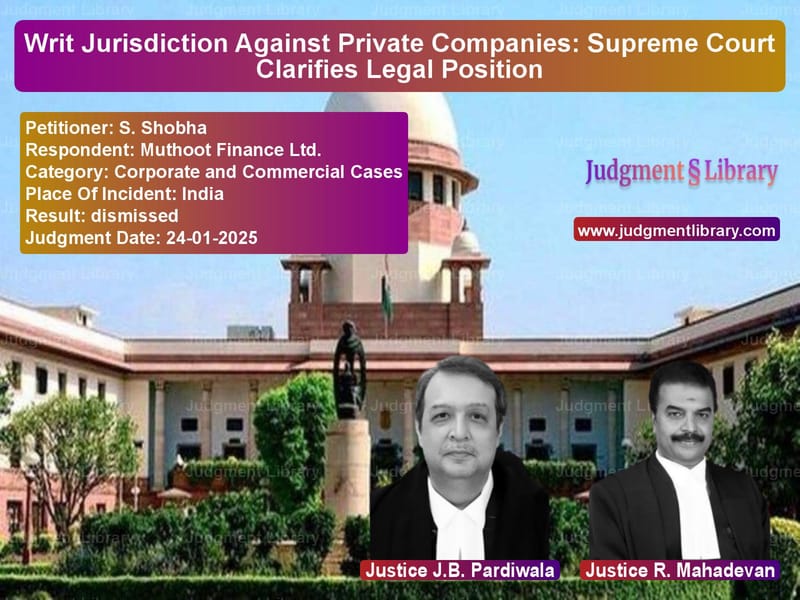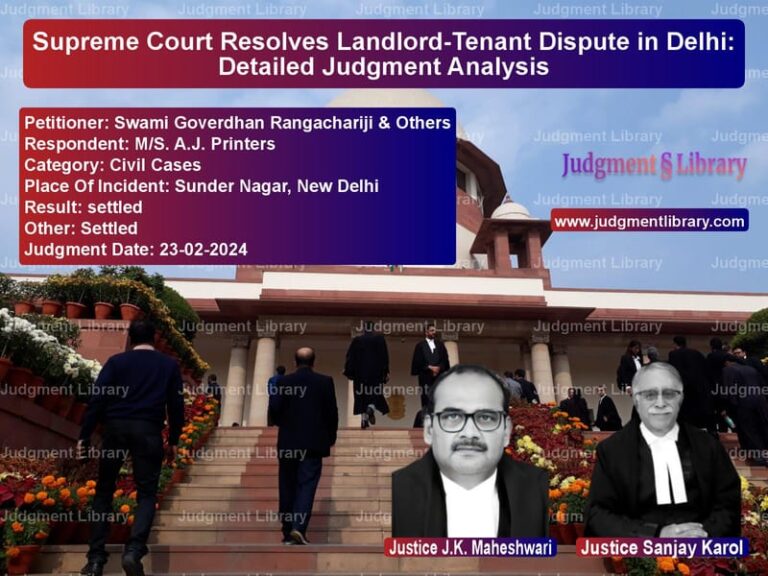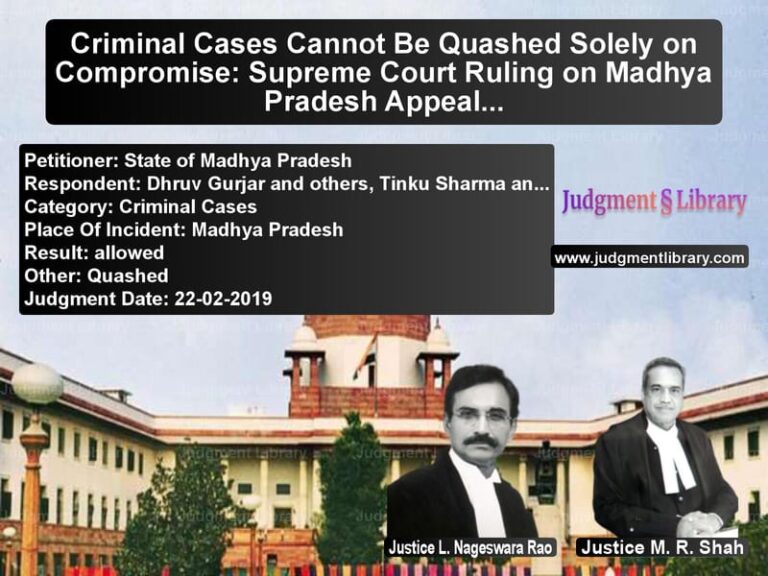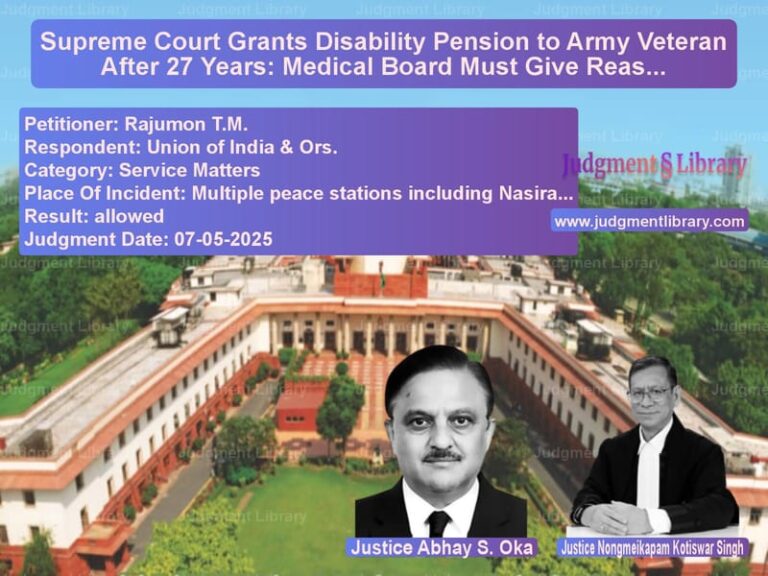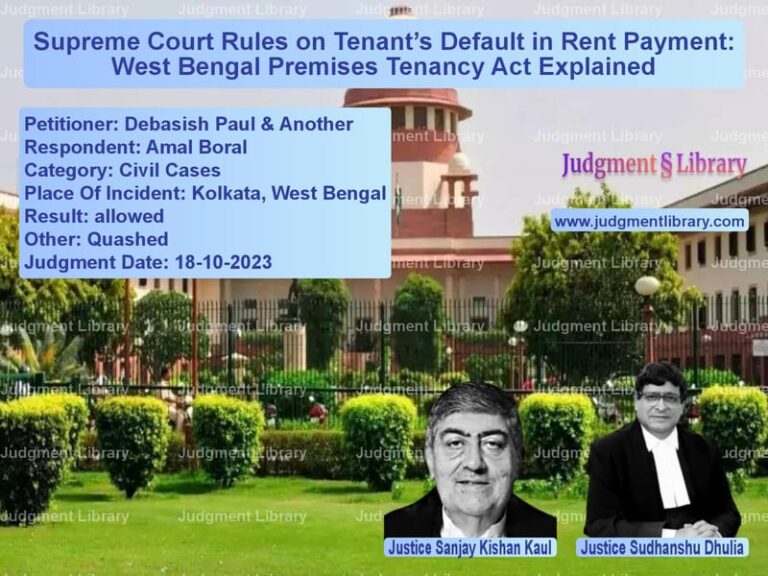Writ Jurisdiction Against Private Companies: Supreme Court Clarifies Legal Position
The Supreme Court of India has delivered a significant judgment in the case of S. Shobha v. Muthoot Finance Ltd., clarifying the applicability of writ jurisdiction under Article 226 of the Constitution against private financial companies. The ruling addressed the legal question of whether a private company, despite being governed by Reserve Bank of India (RBI) regulations, could be subject to writ jurisdiction.
The case revolved around a dispute concerning a gold loan transaction between the petitioner, S. Shobha, and Muthoot Finance Ltd. The petitioner had filed a writ petition before the High Court, alleging that the company had acted contrary to an interim order issued during the COVID-19 pandemic. The High Court dismissed the petition on the grounds that Muthoot Finance Ltd. was not a ‘State’ or an instrumentality of the State under Article 12 of the Constitution and, therefore, was not amenable to writ jurisdiction.
Background of the Case
The petitioner, S. Shobha, had availed a gold loan from Muthoot Finance Ltd., a non-banking financial company (NBFC). During the COVID-19 pandemic, an interim order had been passed regarding loan transactions. However, the petitioner alleged that the company had violated this order, prompting her to file a writ petition before the High Court.
Read also: https://judgmentlibrary.com/supreme-court-clarifies-financial-creditor-status-in-insolvency-cases/
The High Court, while acknowledging the petitioner’s grievances, held that Muthoot Finance Ltd. was a private entity engaged in commercial transactions and was not discharging any public function. It, therefore, ruled that a writ petition under Article 226 was not maintainable against the company and advised the petitioner to seek remedy through civil litigation or arbitration, as per the loan agreement.
Key Legal Issues
The Supreme Court examined the following legal questions:
- Can a writ petition be entertained against a private financial company under Article 226 of the Constitution?
- Does the regulatory oversight of the RBI over NBFCs make them subject to public law obligations?
- What remedies are available to borrowers against private financial institutions in disputes concerning loan transactions?
Arguments of the Parties
Petitioner’s Arguments
Senior Counsel representing the petitioner argued:
- Although Muthoot Finance Ltd. was a private entity, it was governed by the rules and regulations of the RBI and was, therefore, discharging a public function.
- The company’s alleged violation of the interim order during the COVID-19 pandemic required judicial intervention through a writ petition.
- The petitioner had no alternative remedy, as the company had acted arbitrarily in auctioning the pledged gold.
Respondent’s Arguments
The legal counsel for Muthoot Finance Ltd. countered:
- The company was a private entity engaged in commercial transactions and did not perform any sovereign or public function.
- The loan agreement contained an arbitration clause, providing an alternative dispute resolution mechanism.
- The High Court correctly ruled that a writ petition was not maintainable as the company was not a ‘State’ under Article 12.
Key Observations and Judgment
Supreme Court’s Observations
The Supreme Court upheld the High Court’s ruling and emphasized the distinction between public law and private law obligations. The Court relied on precedents such as LIC v. Escorts Ltd. and Sukhdev Singh v. Bhagatram, reiterating that private entities do not become subject to writ jurisdiction merely because they are regulated by statutory bodies like the RBI.
The Court noted:
“A private financial institution, even if regulated by the RBI, does not perform public functions akin to those of the State. The remedy for the petitioner lies in civil proceedings or arbitration as stipulated in the loan agreement.”
Supreme Court’s Final Verdict
The Court laid down key principles regarding writ jurisdiction:
- For a writ petition to be maintainable against a private entity, it must perform public functions or have public law obligations.
- NBFCs like Muthoot Finance Ltd. operate under RBI regulations but do not perform sovereign or public functions.
- Borrowers in disputes with private financial institutions must seek remedies through civil litigation, arbitration, or the RBI Ombudsman.
Implications of the Judgment
This judgment has significant implications for financial litigation in India. It reinforces the principle that private commercial transactions fall outside the purview of writ jurisdiction unless public functions are involved. It also clarifies the legal remedies available to borrowers dealing with NBFCs.
Conclusion
The Supreme Court’s ruling in S. Shobha v. Muthoot Finance Ltd. sets a clear precedent that writ jurisdiction cannot be extended to private financial companies merely because they are regulated by the RBI. This judgment will serve as a guiding principle in similar disputes, ensuring that commercial transactions are adjudicated within the appropriate legal forums rather than under writ jurisdiction.
Petitioner Name: S. Shobha.Respondent Name: Muthoot Finance Ltd..Judgment By: Justice J.B. Pardiwala, Justice R. Mahadevan.Place Of Incident: India.Judgment Date: 24-01-2025.
Don’t miss out on the full details! Download the complete judgment in PDF format below and gain valuable insights instantly!
Download Judgment: s.-shobha-vs-muthoot-finance-ltd.-supreme-court-of-india-judgment-dated-24-01-2025.pdf
Directly Download Judgment: Directly download this Judgment
See all petitions in Company Law
See all petitions in Corporate Compliance
See all petitions in unfair trade practices
See all petitions in Judgment by J.B. Pardiwala
See all petitions in Judgment by R. Mahadevan
See all petitions in dismissed
See all petitions in supreme court of India judgments January 2025
See all petitions in 2025 judgments
See all posts in Corporate and Commercial Cases Category
See all allowed petitions in Corporate and Commercial Cases Category
See all Dismissed petitions in Corporate and Commercial Cases Category
See all partially allowed petitions in Corporate and Commercial Cases Category

